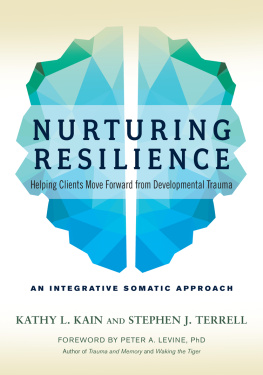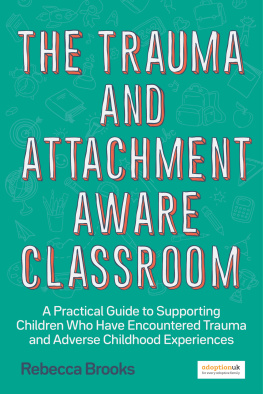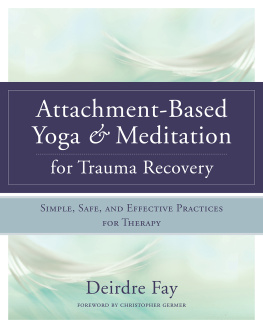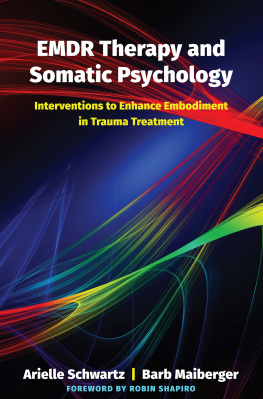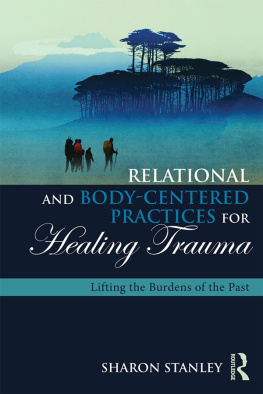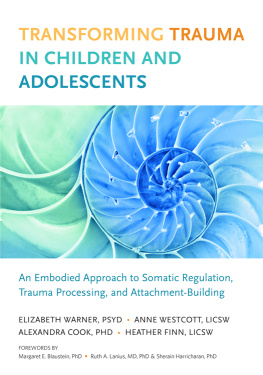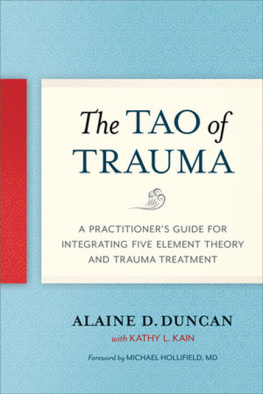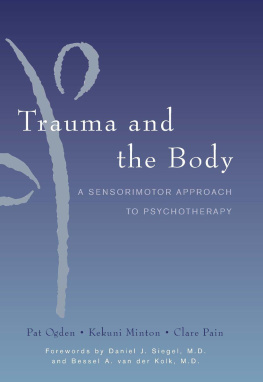
Praise for Nurturing Resilience
In this well-written and researched book, the authors have condensed and made accessible many of the important philosophies that underlie modern psychotherapy practice. [Nurturing Resilience] integrates current relational, developmental, and somatic knowledge to help within the growing populations of emotionally, physiologically, and behaviorally dysregulated individuals presenting in all levels of our society.
Tony Richardson, somatic psychiatrist
This book synthesizes the simplicity of our human quest for safety and connection with the complexities of our biological design. As vanguards in somatic therapies, Kathy and Stephen have trained thousands of therapists all over the world and are now graciously imparting their strategies for resilience through this gift of their combined wisdom.
Christopher Walling, PsyD, president of the United States Association of Body Psychotherapy
Nurturing Resilience explains how early childhood trauma not only affects us psychologically but has a profound effect on our physiology. Stephen J. Terrell and Kathy L. Kain are leading experts in the physiology of trauma and how to untangle the mystery of modern disease.
Shirley Impellizzeri, PhD, SEP, author of Why Cant I Change?: How to Conquer Your Self-Destructive Patterns and coauthor of Scared Speechless: 9 Ways to Overcome Your Fears and Captivate Your Audience
Nurturing Resilience is a tour de force contribution to the growing field of neuroscience-informed, somatic approaches. Its argument foregrounds a central problem: a disconnect between medical approaches to complex, physiological symptoms and psychological support, the impact of which has compromised understanding of what constitutes and builds resilience. Nurturing Resilience stands apart in its ability to bridge, in accessible ways, medical and somatic psychological conversations.
Kesha Fikes, PhD, RSMT, anthropologist, somatic therapist, and core somatic studies faculty member at the Pacifica Graduate Institute
At last! A book written by two of the master teachers in somatic touch and trauma! Nurturing Resilience blends theory, stories, and clinical examples beautifully and skillfully into a reader-friendly volume. This will be a valued resource on my bookshelf for years to come and is a must-read for anyone who works with early and developmental trauma.
Ellen Keating, PsyD
This is a go-to book for any practitioner working with clients dealing with trauma. Terrell and Kain beautifully outline the origins of developmental trauma, how our nervous system adapts and supports the complexity of symptoms later in life, and how to respond/intervene in service of greater health. To understand developmental trauma as beautifully explained here is to understand and appreciate our most challenging clients. If you read only one book, this is it.
Berns Galloway, MEd, Somatic Experiencing instructor at the Somatic Experiencing Trauma Institute
Kathy Kain and Steve Terrell have produced a scholarly, comprehensive and coherent exploration of the complex terrain of developmental trauma. Nurturing Resilience promises to inspire clinicians to cultivate new, somatically based approaches that engage the physiological foundations of healthy attachment and inner regulation.
Alaine D. Duncan, MAc, LAc, Dipl.Ac
This is the book weve been waiting for. Kathy Kain and Steve Terrell, two exceptional clinicians and trauma trainers, share with us their joint expertise in the therapeutic healing of early, developmental trauma. With insight and clarity, they lay out a conceptual framework that elegantly integrates theories of attachment, neuro-development, the autonomic nervous system, and mind-body psychology in order to illuminate the complex underpinnings of early trauma.
Jacalyn Brecher, health and wellness advocate
Terrell and Kain have found an intersection between our earliest physiological development and attachment patterns and developed a method that helps increase regulation in even the most symptomatic clients. Their deep understanding of stress and attachment physiology, combined with the psychological and emotional components, opens a path to healing that is often much easier for clients to undertake than traditional talk therapies. This work has absolutely transformed my practice and given me a whole new lens to see the root cause of deep hurt in my clients.
Brandy Vanderheiden MA, MFT
Brilliant! Kathy and Stephen have produced a groundbreaking work that provides a deeper understanding of the interface between developmental trauma and mental and physical disorders and most importantly the pathways to their healing.
Michael Ocana, MD, medical director of Kelowna Adolescent Psychiatric Unit and clinical assistant professor at the University of British Columbia
Kathy Kain is one of the worlds leading experts on working through the body to resolve trauma and expand resilience. She brings breadth and depth into her approach, yet teaches in a way that is practical and clear. She is masterful at interweaving the principles and strategies of Somatic Experiencing, attachment therapy, and polyvagal theory to create a powerful foundation for finding and working with the challenges of early preverbal and nonverbal elements of traumatic experience to promote the permanent reintegration of self. I strongly recommend her work.
Maggie Phillips, PhD, coauthor of Freedom from Pain: Reversing Chronic Pain and Healing the Divided Self
[Steve provides] an experiential space wherein learning and growth can happen. It is a difference between the top down teacher approach, and the we are all on the same plane and open to the possibility of experience facilitator approach. We each change in relation to the experience and what we are ready to take in at that moment.
Samantha Persoff, LMFT, trauma therapist
The work of Kathy Kain and Stephen Terrell has provided a missing piece in working with developmental trauma, complex PTSD, and attachment trauma. Their understanding of the physiology of trauma and the complexities of attachment bring well-grounded hope to clinician and client alike. With their work, you will learn to use compassion with practical, hands on techniques that support change, growth, and healing. Their work has transformed my understanding and work as a therapist.
Terry D. Trotter, MFT
[Kathy Kain and Steve Terrell] have worked as a team towards the development of an integrative treatment philosophy that combines heart and the best of known science. Their unique practice domains approach the spectrum of dysregulation from its earliest inception all the way to the other end of the spectrum. The music underneath their lyrics hums with resilience and optimism.
Kathleen Adams, PhD
Copyright 2018 by Kathy L. Kain and Stephen J. Terrell. All rights reserved. No portion of this book, except for brief review, may be reproduced, stored in a retrieval system, or transmitted in any form or by any meanselectronic, mechanical, photocopying, recording, or otherwisewithout the written permission of the publisher. For information contact North Atlantic Books.
Published by
North Atlantic Books
Berkeley, California
Cover art Shutterstock.com/KindheartedStock
Cover design by Rob Johnson
Book design by Happenstance Type-O-Rama
Printed in the United States of America
Nurturing Resilience: Helping Clients Move Forward from Developmental Trauma
Next page
